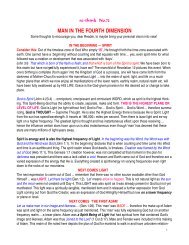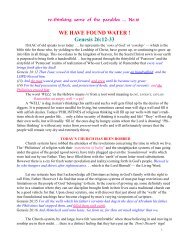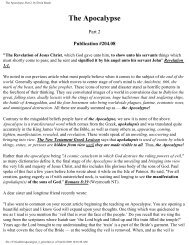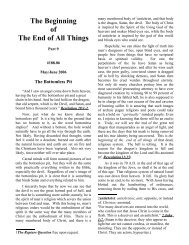You also want an ePaper? Increase the reach of your titles
YUMPU automatically turns print PDFs into web optimized ePapers that Google loves.
116 • LINCOLN THE UNKNOWNa century, and various States at one time or ano<strong>the</strong>r had threatenedto leave <strong>the</strong> Union. For example: during <strong>the</strong> War of 1812<strong>the</strong> New England States talked very seriously of forming a separatenation; and <strong>the</strong> Connecticut Legislature passed a resolutiondeclaring that "<strong>the</strong> state of Connecticut is a free, sovereign andindependent state."Even <strong>Lincoln</strong> himself had once believed in <strong>the</strong> right of secession.He had said during a speech in Congress: "Any peopleanywhere, being inclined and having <strong>the</strong> power, have <strong>the</strong> rightto rise up and shake off <strong>the</strong> existing government, and form anew one that suits <strong>the</strong>m better. That is a most valuable, a mostsacred right—a right which we hope and believe is to liberate<strong>the</strong> world."Nor is <strong>the</strong> right confined to cases in which <strong>the</strong> whole peopleof an existing government may choose to exercise it. Any portionof such people that can, may revolutionize and make <strong>the</strong>irown of so much of <strong>the</strong> territory as <strong>the</strong>y inhabit."He had said that in 1848. This, however, was 1860, and heno longer believed it. But <strong>the</strong> South did. Six weeks after <strong>Lincoln</strong>'selection South Carolina passed an Ordinance of Secession.Charleston celebrated <strong>the</strong> new "Declaration of Independence"with martial music and bonfires and fireworks and dancing in<strong>the</strong> streets. Six o<strong>the</strong>r States followed in rapid succession; andtwo days before <strong>Lincoln</strong> left Springfield for Washington, JeffersonDavis was elected President of a new nation, founded uponwhat was called "<strong>the</strong> great truth . . . that slavery is <strong>the</strong> negro'snatural and normal condition."The outgoing administration of Buchanan, honeycombed withdisloyalty, did nothing whatever to prevent all this; so <strong>Lincoln</strong>was obliged to sit helplessly in Springfield for three months, andwatch <strong>the</strong> Union dissolving and <strong>the</strong> republic tottering on <strong>the</strong>verge of ruin. He saw <strong>the</strong> Confederacy buying guns and buildingforts and drilling soldiers; and he realized that he would haveto lead a people through a civil war—bitter and bloody.He was so distressed that he couldn't sleep at night. He lostforty pounds in weight, from worry.<strong>Lincoln</strong>, who was superstitious,believed that coming eventscast <strong>the</strong>ir shadow through dreams and omens. The day after hiselection in 1860 he went home in <strong>the</strong> afternoon and threw himselfdown on a haircloth sofa. Opposite him was a bureau witha swinging mirror; and, as he looked into <strong>the</strong> mirror, he sawhimself reflected with one body but with two faces—one very
















